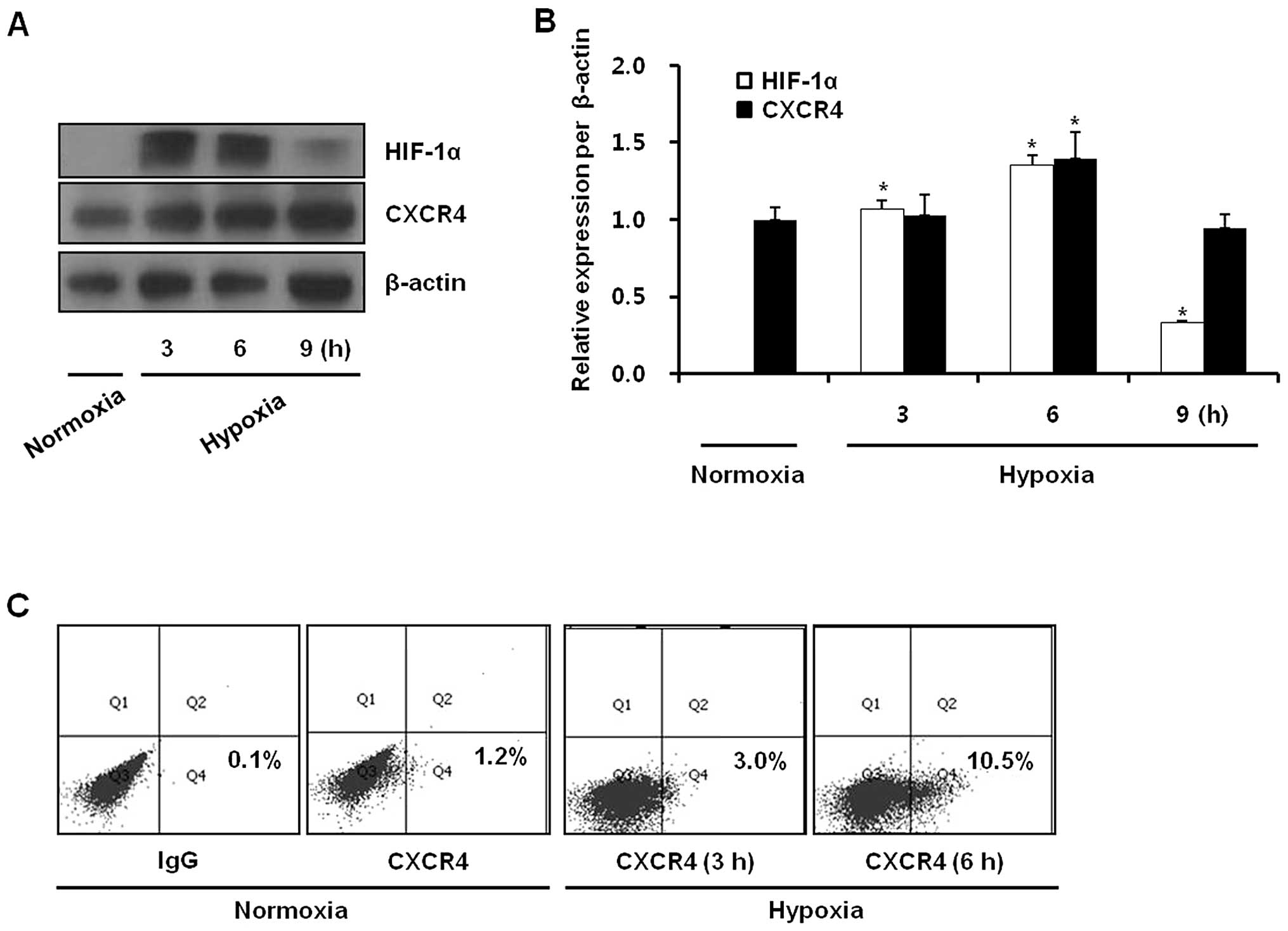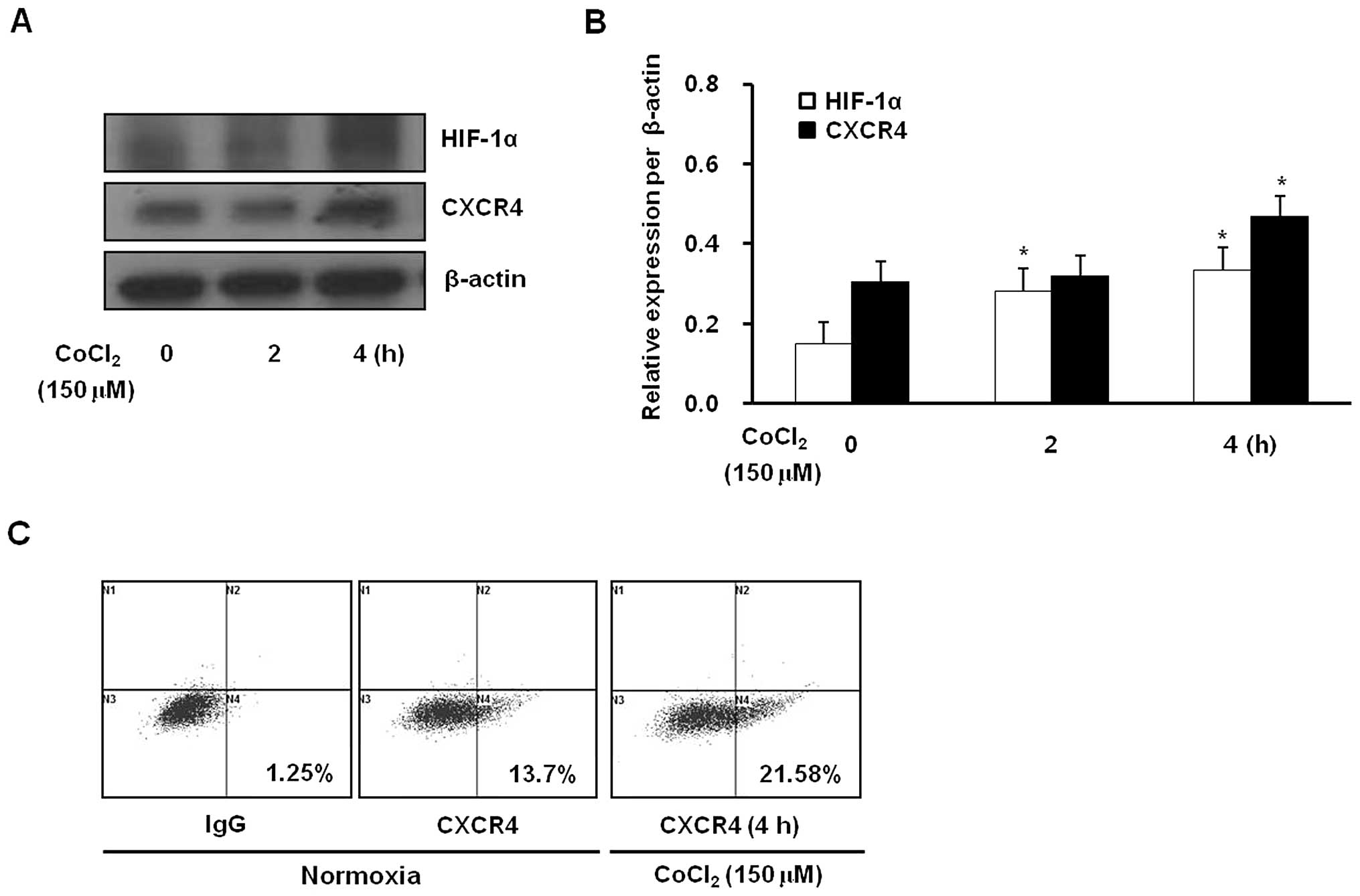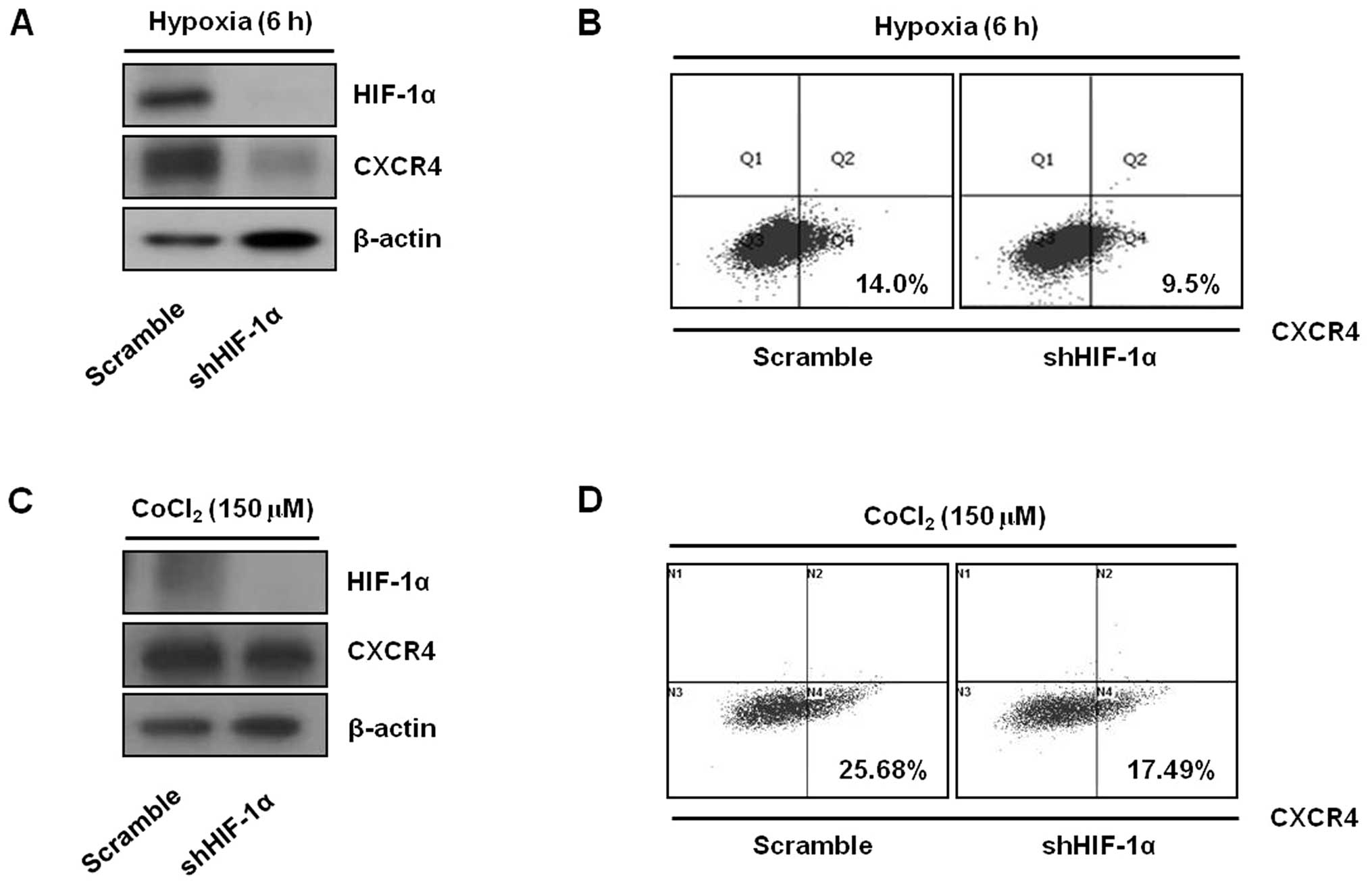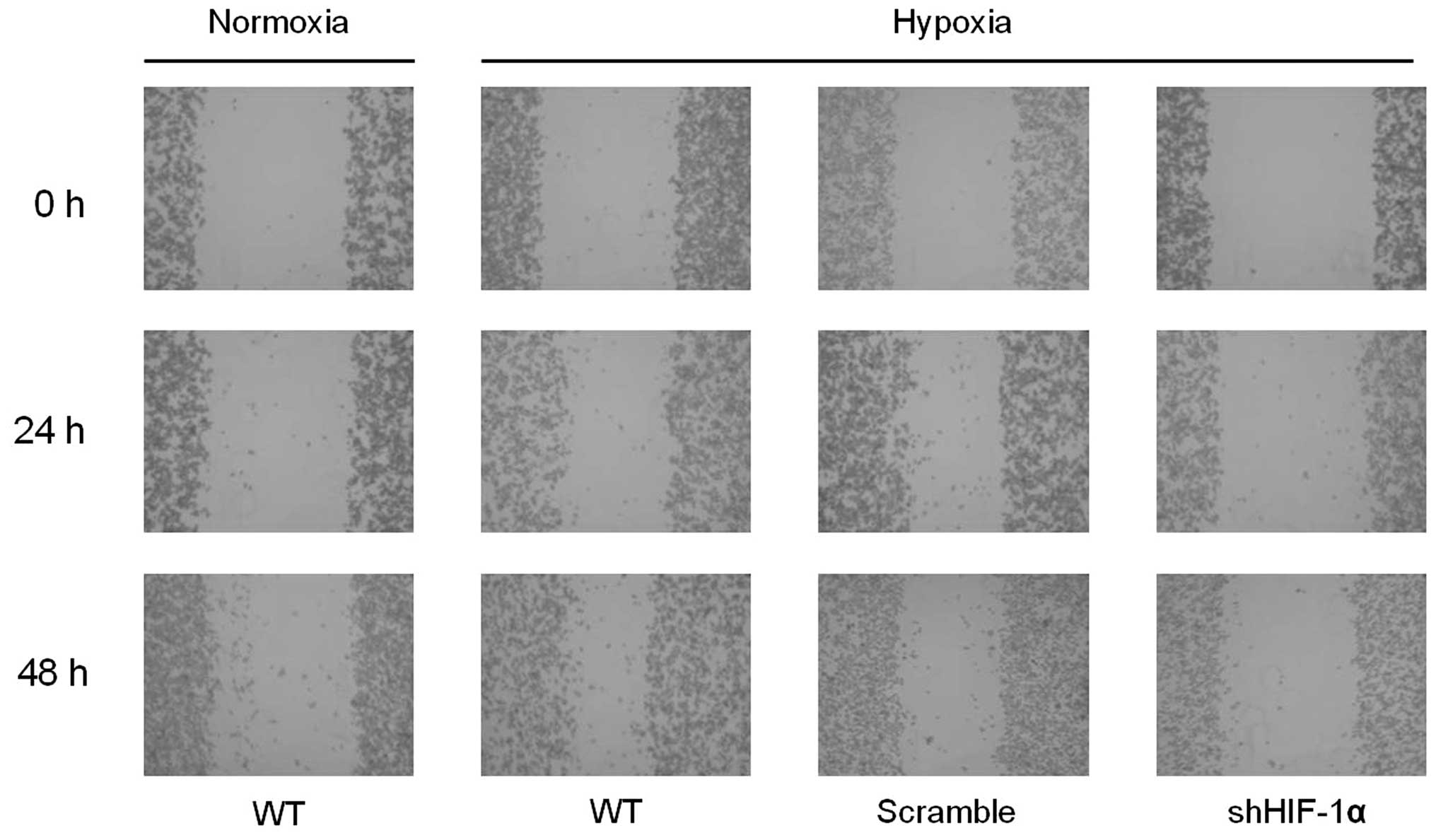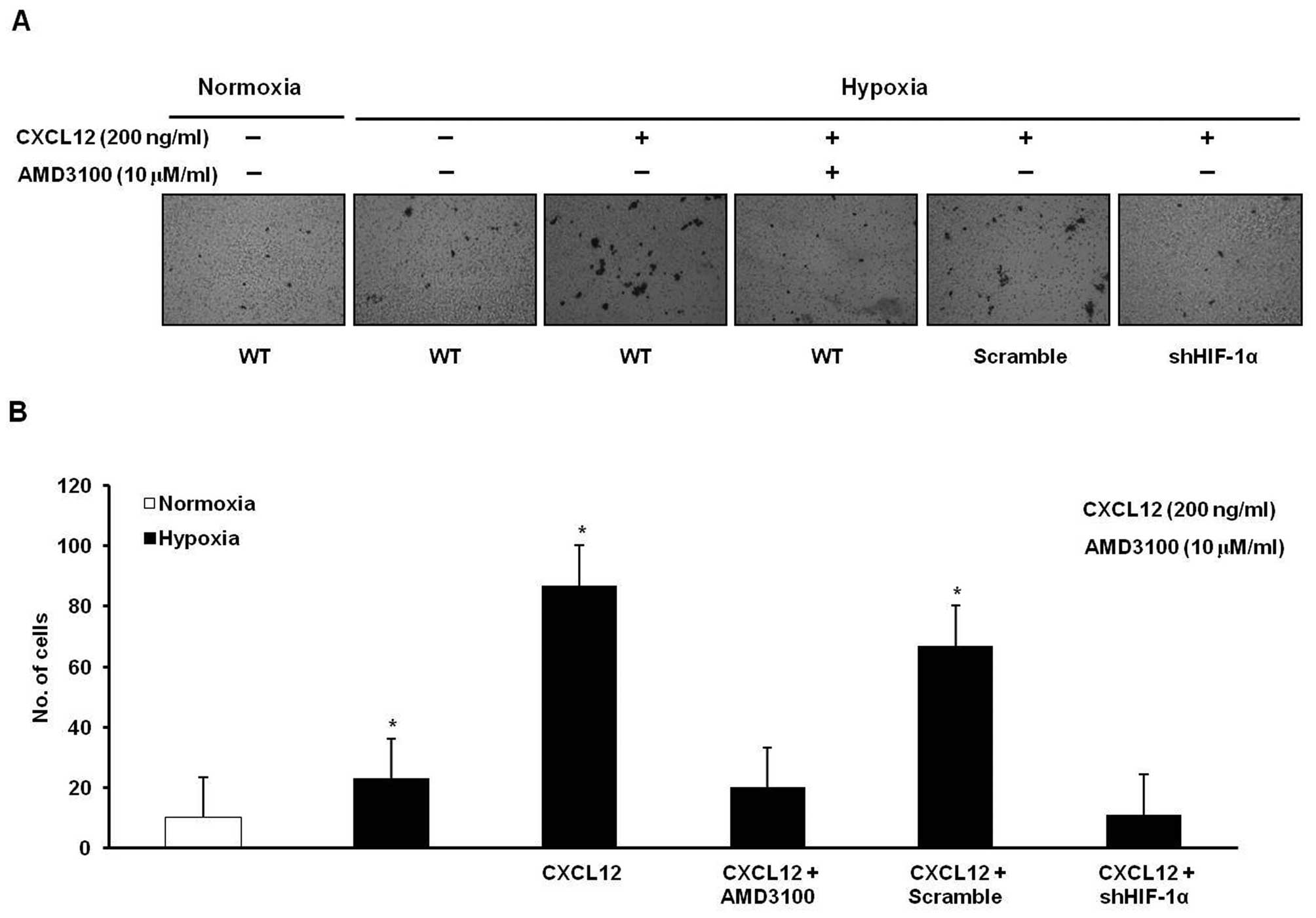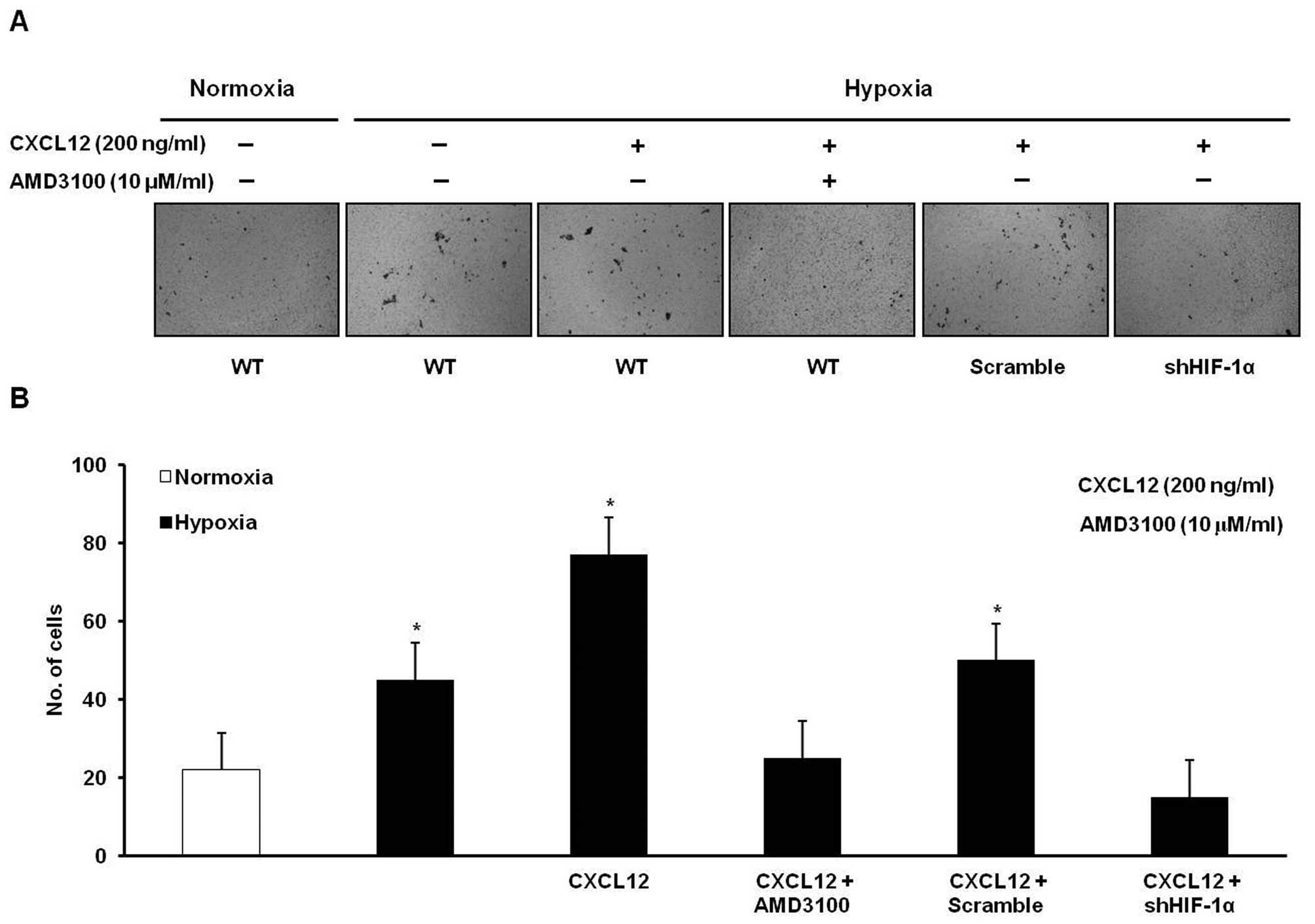|
1
|
Kamangar F, Dores GM and Anderson WF:
Patterns of cancer incidence, mortality, and prevalence across five
continents: defining priorities to reduce cancer disparities in
different geographic regions of the world. J Clin Oncol.
24:2137–2150. 2006. View Article : Google Scholar
|
|
2
|
Lee HJ, Cho do Y, Park JC, et al: Phase II
trial of biweekly paclitaxel plus infusional 5-fluorouracil and
leucovorin in patients with advanced or recurrent inoperable
gastric cancer. Cancer Chemother Pharmacol. 63:427–432. 2009.
View Article : Google Scholar : PubMed/NCBI
|
|
3
|
Cheng WL, Wang CS, Huang YH, Tsai MM,
Liang Y and Lin KH: Overexpression of CXCL1 and its receptor CXCR2
promote tumor invasion in gastric cancer. Ann Oncol. 22:2267–2276.
2011. View Article : Google Scholar : PubMed/NCBI
|
|
4
|
Lee HJ, Huang SM, Kim HY, et al:
Evaluation of the combined expression of chemokine SDF-1 alpha and
its receptor CXCR4 as a prognostic marker for gastric cancer. Exp
Ther Med. 2:499–504. 2011.PubMed/NCBI
|
|
5
|
Shen Z, Seppanen H, Vainionpaa S, et al:
IL10, IL11, IL18 are differently expressed in CD14(+) TAMs and play
different role in regulating the invasion of gastric cancer cells
under hypoxia. Cytokine. 59:352–357. 2012.PubMed/NCBI
|
|
6
|
Song IC, Liang ZL, Lee JC, et al:
Expression of stromal cell-derived factor-1α is an independent risk
factor for lymph node metastasis in early gastric cancer. Oncol
Lett. 2:1197–1202. 2011.
|
|
7
|
Fiegl M, Samudio I, Clise-Dwyer K, Burks
JK, Mnjoyan Z and Andreeff M: CXCR4 expression and biologic
activity in acute myeloid leukemia are dependent on oxygen partial
pressure. Blood. 113:1504–1512. 2009. View Article : Google Scholar : PubMed/NCBI
|
|
8
|
Muller A, Homey B, Soto H, et al:
Involvement of chemokine receptors in breast cancer metastasis.
Nature. 410:50–56. 2001. View
Article : Google Scholar : PubMed/NCBI
|
|
9
|
Richard CL, Tan EY and Blay J: Adenosine
upregulates CXCR4 and enhances the proliferative and migratory
responses of human carcinoma cells to CXCL12/SDF-1alpha. Int J
Cancer. 119:2044–2053. 2006. View Article : Google Scholar : PubMed/NCBI
|
|
10
|
Sun X, Cheng G, Hao M, et al:
CXCL12/CXCR4/CXCR7 chemokine axis and cancer progression. Cancer
Metastasis Rev. 29:709–722. 2010. View Article : Google Scholar : PubMed/NCBI
|
|
11
|
Wang Y, Li Z, Zhang H, et al: HIF-1alpha
and HIF-2alpha correlate with migration and invasion in gastric
cancer. Cancer Biol Ther. 10:376–382. 2010. View Article : Google Scholar : PubMed/NCBI
|
|
12
|
Wang X, Li C, Chen Y, et al: Hypoxia
enhances CXCR4 expression favoring microglia migration via
HIF-1alpha activation. Biochem Biophys Res Commun. 371:283–288.
2008. View Article : Google Scholar : PubMed/NCBI
|
|
13
|
Schioppa T, Uranchimeg B, Saccani A, et
al: Regulation of the chemokine receptor CXCR4 by hypoxia. J Exp
Med. 198:1391–1402. 2003. View Article : Google Scholar : PubMed/NCBI
|
|
14
|
Krishnamachary B, Berg-Dixon S, Kelly B,
et al: Regulation of colon carcinoma cell invasion by
hypoxia-inducible factor 1. Cancer Res. 63:1138–1143.
2003.PubMed/NCBI
|
|
15
|
Ishikawa T, Nakashiro K, Klosek SK, et al:
Hypoxia enhances CXCR4 expression by activating HIF-1 in oral
squamous cell carcinoma. Oncol Rep. 21:707–712. 2009.PubMed/NCBI
|
|
16
|
Cronin PA, Wang JH and Redmond HP: Hypoxia
increases the metastatic ability of breast cancer cells via
upregulation of CXCR4. BMC Cancer. 10:2252010. View Article : Google Scholar : PubMed/NCBI
|
|
17
|
Schutyser E, Su Y, Yu Y, et al: Hypoxia
enhances CXCR4 expression in human microvascular endothelial cells
and human melanoma cells. Eur Cytokine Netw. 18:59–70.
2007.PubMed/NCBI
|
|
18
|
Lee HJ, Lee K, Lee DG, et al: Chemokine
(C-X-C motif) ligand 12 is associated with gallbladder carcinoma
progression and is a novel independent poor prognostic factor. Clin
Cancer Res. 18:3270–3280. 2012. View Article : Google Scholar : PubMed/NCBI
|
|
19
|
Kwak MK, Hur K, Park DJ, et al: Expression
of chemokine receptors in human gastric cancer. Tumour Biol.
26:65–70. 2005. View Article : Google Scholar : PubMed/NCBI
|
|
20
|
Yasumoto K, Koizumi K, Kawashima A, et al:
Role of the CXCL12/CXCR4 axis in peritoneal carcinomatosis of
gastric cancer. Cancer Res. 66:2181–2187. 2006. View Article : Google Scholar : PubMed/NCBI
|
|
21
|
Lee HJ, Kim SW, Kim HY, et al: Chemokine
receptor CXCR4 expression, function, and clinical implications in
gastric cancer. Int J Oncol. 34:473–480. 2009.PubMed/NCBI
|
|
22
|
Pituch-Noworolska A, Drabik G, Szatanek R,
et al: Immunophenotype of isolated tumour cells in the blood, bone
marrow and lymph nodes of patients with gastric cancer. Pol J
Pathol. 58:93–97. 2007.PubMed/NCBI
|
|
23
|
Sun XJ, Sun KL, Zheng ZH, et al: Gene
expression patterns in gastric cancer. Zhonghua Yi Xue Yi Chuan Xue
Za Zhi. 23:142–146. 2006.PubMed/NCBI
|
|
24
|
Hashimoto I, Koizumi K, Tatematsu M, et
al: Blocking on the CXCR4/mTOR signalling pathway induces the
anti-metastatic properties and autophagic cell death in peritoneal
disseminated gastric cancer cells. Eur J Cancer. 44:1022–1029.
2008. View Article : Google Scholar : PubMed/NCBI
|
|
25
|
Tsuboi K, Kodera Y, Nakanishi H, et al:
Expression of CXCL12 and CXCR4 in pT3-stage gastric cancer does not
correlate with peritoneal metastasis. Oncol Rep. 20:1117–1123.
2008.PubMed/NCBI
|
|
26
|
Iwasa S, Yanagawa T, Fan J and Katoh R:
Expression of CXCR4 and its ligand SDF-1 in intestinal-type gastric
cancer is associated with lymph node and liver metastasis.
Anticancer Res. 29:4751–4758. 2009.PubMed/NCBI
|
|
27
|
Arigami T, Natsugoe S, Uenosono Y, et al:
CCR7 and CXCR4 expression predicts lymph node status including
micrometastasis in gastric cancer. Int J Oncol. 35:19–24. 2009.
View Article : Google Scholar : PubMed/NCBI
|
|
28
|
Zhao BC, Wang ZJ, Mao WZ, et al:
CXCR4/SDF-1 axis is involved in lymph node metastasis of gastric
carcinoma. World J Gastroenterol. 17:2389–2396. 2011. View Article : Google Scholar : PubMed/NCBI
|
|
29
|
Ding YL, Zhang JL, Tang SF, Fu QY and Li
ZT: Effect of chemokine stromal cell derived factor-1 and its
receptor CXCR4 on the peritoneal carcinometastasis of gastric
cancer. Zhonghua Yi Xue Za Zhi. 88:202–205. 2008.(In Chinese).
|
|
30
|
Koizumi K, Kato S, Sakurai H, Hashimoto I,
Yasumoto K and Saiki I: Therapeutics target of CXCR4 and its
downstream in peritoneal carcinomatosis of gastric cancer. Front
Biosci (Schol Ed). 4:269–276. 2012. View
Article : Google Scholar : PubMed/NCBI
|
|
31
|
Noda S, Yashiro M, Nshii T and Hirakawa K:
Hypoxia upregulates adhesion ability to peritoneum through a
transforming growth factor-beta-dependent mechanism in diffuse-type
gastric cancer cells. Eur J Cancer. 46:995–1005. 2010. View Article : Google Scholar : PubMed/NCBI
|
|
32
|
Hockel M, Schlenger K, Hockel S and Vaupel
P: Hypoxic cervical cancers with low apoptotic index are highly
aggressive. Cancer Res. 59:4525–4528. 1999.PubMed/NCBI
|
|
33
|
Zhong H, De Marzo AM, Laughner E, et al:
Overexpression of hypoxia-inducible factor 1alpha in common human
cancers and their metastases. Cancer Res. 59:5830–5835.
1999.PubMed/NCBI
|
|
34
|
Hynes RO: Metastatic potential: generic
predisposition of the primary tumor or rare, metastatic variants-or
both? Cell. 113:821–823. 2003. View Article : Google Scholar : PubMed/NCBI
|
|
35
|
Griffiths EA, Pritchard SA, Welch IM,
Price PM and West CM: Is the hypoxia-inducible factor pathway
important in gastric cancer? Eur J Cancer. 41:2792–2805. 2005.
View Article : Google Scholar : PubMed/NCBI
|
|
36
|
Hockel M, Schlenger K, Aral B, Mitze M,
Schaffer U and Vaupel P: Association between tumor hypoxia and
malignant progression in advanced cancer of the uterine cervix.
Cancer Res. 56:4509–4515. 1996.PubMed/NCBI
|
|
37
|
Generali D, Berruti A, Brizzi MP, et al:
Hypoxia-inducible factor-1alpha expression predicts a poor response
to primary chemoendocrine therapy and disease-free survival in
primary human breast cancer. Clin Cancer Res. 12:4562–4568. 2006.
View Article : Google Scholar
|
|
38
|
Bachtiary B, Schindl M, Potter R, et al:
Overexpression of hypoxia-inducible factor 1alpha indicates
diminished response to radiotherapy and unfavorable prognosis in
patients receiving radical radiotherapy for cervical cancer. Clin
Cancer Res. 9:2234–2240. 2003.
|
|
39
|
Schindl M, Schoppmann SF, Samonigg H, et
al: Overexpression of hypoxia-inducible factor 1alpha is associated
with an unfavorable prognosis in lymph node-positive breast cancer.
Clin Cancer Res. 8:1831–1837. 2002.PubMed/NCBI
|
|
40
|
Pan J, Mestas J, Burdick MD, et al:
Stromal derived factor-1 (SDF-1/CXCL12) and CXCR4 in renal cell
carcinoma metastasis. Mol Cancer. 5:562006. View Article : Google Scholar : PubMed/NCBI
|
|
41
|
Phillips RJ, Mestas J, Gharaee-Kermani M,
et al: Epidermal growth factor and hypoxia-induced expression of
CXC chemokine receptor 4 on non-small cell lung cancer cells is
regulated by the phosphatidylinositol 3-kinase/PTEN/AKT/mammalian
target of rapamycin signaling pathway and activation of hypoxia
inducible factor-1alpha. J Biol Chem. 280:22473–22481. 2005.
|
|
42
|
Shim H, Lau SK, Devi S, Yoon Y, Cho HT and
Liang Z: Lower expression of CXCR4 in lymph node metastases than in
primary breast cancers: potential regulation by ligand-dependent
degradation and HIF-1alpha. Biochem Biophys Res Commun.
346:252–258. 2006. View Article : Google Scholar : PubMed/NCBI
|
|
43
|
Kim SW, Kim HY, Lee HJ, Yun HJ, Kim S and
Jo DY: Dexamethasone and hypoxia upregulate CXCR4 expression in
myeloma cells. Leuk Lymphoma. 50:1163–1173. 2009. View Article : Google Scholar : PubMed/NCBI
|
|
44
|
Sun X, Wei L, Chen Q and Terek RM:
CXCR4/SDF1 mediate hypoxia induced chondrosarcoma cell invasion
through ERK signaling and increased MMP1 expression. Mol Cancer.
9:172010. View Article : Google Scholar : PubMed/NCBI
|
|
45
|
Dunn LK, Mohammad KS, Fournier PG, et al:
Hypoxia and TGF-beta drive breast cancer bone metastases through
parallel signaling pathways in tumor cells and the bone
microenvironment. PloS One. 4:e68962009. View Article : Google Scholar : PubMed/NCBI
|
|
46
|
Zagzag D, Lukyanov Y, Lan L, et al:
Hypoxia-inducible factor 1 and VEGF upregulate CXCR4 in
glioblastoma: implications for angiogenesis and glioma cell
invasion. Lab Invest. 86:1221–1232. 2006. View Article : Google Scholar : PubMed/NCBI
|
|
47
|
Mahaseth H and Kaufman J: Optimizing stem
cell collection through CXCR4 antagonists. Front Biosci (Schol Ed).
4:611–619. 2012.PubMed/NCBI
|
|
48
|
Gangadhar T, Nandi S and Salgia R: The
role of chemokine receptor CXCR4 in lung cancer. Cancer Biol Ther.
9:409–416. 2010. View Article : Google Scholar : PubMed/NCBI
|
|
49
|
Iwanaga T, Iwasaki Y, Ohashi M, Nunobe S
and Iwagami S: Establishment of a CXCR4-expressing gastric cancer
cell line in nude mice and the effect of AMD 3100 on tumor
regression. Gan To Sagaku Ryoho. 34:1917–1919. 2007.(In
Japanese).
|















